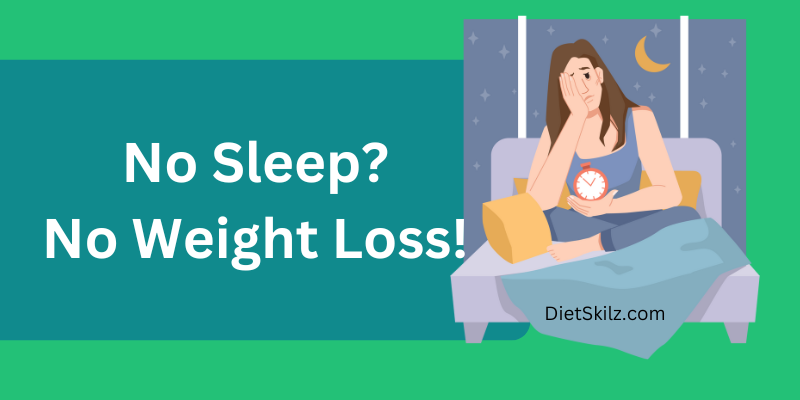Can Insomnia Affect Your Weight Loss Goals? The answer is yes, and the connection between sleep and weight loss is more significant than many realize. Insomnia, or the inability to get adequate restful sleep, can disrupt the balance of hormones like ghrelin and leptin, which regulate hunger and appetite.
This imbalance often leads to increased cravings, particularly for high-calorie, sugary foods, making it harder to stick to a healthy eating plan. Additionally, lack of sleep can slow your metabolism and reduce energy levels, impacting your ability to stay active and burn calories.
If you’re struggling to meet your weight loss goals, addressing insomnia might be the missing piece to your success. So, let’s dig into this a little deeper, and see what happens to your weight loss goals when you don’t get enough sleep.
How Can Insomnia Affect Your Weight Loss Goals?
What we learn from this is that skipping meals as a strategy for fast weight loss could undermine both your metabolism and sleep patterns. If you’re skipping meals and wake up hungry in the middle of the night, it could be because of blood sugar levels dropping from not eating.
For the best performance in life we all need a minimum of 7-8 hours of sleep each night. That 7-8 hours should be deep and restful sleep, and not a night of tossing and turning. When sleep is suffering, your body’s ability to perform at its highest levels suffers.
The consensus is that drinking caffeinated drinks after 2pm is affecting sleep during the night and causing insomnia. Eating heavy meals late in the evening, just before going to bed has about the same affect. Both scenarios keep you wired or your body working to digest food at night. The results is that you never get into a deep sleep pattern and all the natural weight loss tips in the world won’t help.
The end result of that is that even with 9-10 hours of poor sleep, you’re equally tired and exhausted the following day as if you had only got 5 hours of better sleep.
Hormones and Metabolism
It’s become clear in the last few years that the hormones Leptin and Ghrelin have a profound effect on weight loss and weight loss goals. However, these hormones also play into our sleep patterns as well.
The Leptin is for signaling us to quit eating when we’re full and helps us feel satisfied with a meal. Ghrelin signals us when our stomach is empty, energy is about to get low, and it’s time to eat.
Now we know that there’s a relationship between people with sleep deprivation and increased Ghrelin. With high levels of Ghrelin, we stay ready to eat all the time-making it easier to gain weight.
It’s also easier to gain weight when you are sleep deprived because not enough sleep means slower metabolism. Combining the fact that inadequate sleep and that inadequacy leading to more of the hormone Ghrelin, you can see how insomnia affects your weight.
Cortisol and Weight Gain
If that’s not enough, there’s another hormone called cortisol that’s released whenever you are stressed. The insomnia naturally leads to more stress, which leads to copious amounts of Cortisol entering your bloodstream. Both the increase of Cortisol and the stress can make you feel hungry and want to eat when you are full.
Now it’s easy to get even more stressed when you realize you are doing everything you can to lose weight, and nothing is happening. See what’s happening now? Your body is releasing even more Coritsol with the worry and negative self image-which is affecting your weight even more.
What To Do When Insomnia Is Curbing Your Weight Loss Goals?
- Drink nothing with caffeine after 2pm. (I’ve found that cutting the caffeine after noon works best for me)
- Instead of caffeine change to decaffeinated drinks. (Try drinking herbal teas in the afternoon and evenings. Chamomile tea is well thought of for relaxation and helping people with restful sleep)
- Valerian is another herb taken as either a tea or capsule that helps with insomnia
- 5-HTP is actually an amino acid that people are taking for insomnia, anxiety and obesity
These sleep remedies are available at health food stores, pharmacies, and Walmart.
More Tips for Countering Insomnia
- Even though exercise is a must for weight loss, physical activity increases your energy levels, leaving you wide awake. With that in mind, avoid exercising late at night.
- Take a long hot bath just prior to going to bed for complete relaxation of mind and body.
- Turn off the TV, computer, and everything electronic at least an hour before bedtime.
- Because we know that 1) sleep is important to health 2) insomnia makes it difficult to lose weight-it’s important enough to see a doctor if your lack of sleep continues.
Summary
In the end, the question remains—can insomnia affect your weight loss goals?
Absolutely.
The connection between sleep, metabolism, and hunger hormones is undeniable, making quality rest a critical factor in any weight loss journey. When you don’t get enough sleep, your body craves unhealthy foods, your metabolism slows, and stress hormones like cortisol make it even harder to shed pounds.
By prioritizing good sleep habits—cutting caffeine early, managing stress, and creating a restful nighttime routine—you give yourself a better chance at reaching your weight loss goals.
If insomnia persists, don’t hesitate to seek professional help, because quality sleep is just as important as diet and exercise when it comes to losing weight.
